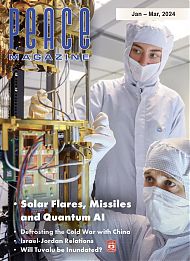The Russia-Ukraine war is the largest military conflict on the European continent since 1945. Today Ukraine’s battlefields resemble the grim trench warfare in France during WWI, though with drones as the “Gods of war” instead of artillery. And though, unlike WWI, this is still a war between two states whose political and military leadership make the crucial decisions, both sides significantly depend, crucially in the case of Ukraine, on support from other nations and non-state actors. So, in a sense, this is both a regional and a global conflict, in which different nations and political parties are stakeholders. So, societies in other countries can influence the tragic events unfolding in front of our eyes. However, civil society and the peacebuilding community face these key dilemmas:
1) Peace vs. Justice. No war is entirely black and white, but in few other cases in the modern world is the distinction between the aggressor and the victim so clear. Russia still controls much of Ukraine, where millions of Ukrainians live under occupation. Under such conditions, what are the possibilities of a “peace for territory” a formula?
2) Is there space for nonviolence in the midst of the largest European war since 1945? Since Russian tanks rolled into Ukraine, the world had seen massive pro-Ukrainian demonstrations in occupied areas. Nonviolent resistance shattered Putin’s hope to enlist cooperation from the people, whom he claimed to be “saving from a Nazi regime”. Today, two years into the war, is any space left for effective nonviolent action? And if so, what kind of action?
3) Is Russia doomed to be an adversary of the West? Twenty years ago, Russia, despite certain concerns and misunderstandings, was seen as becoming part of the Western world. It was, in fact, a US ally during the “war on terror”. Russians were at the table at NATO headquarters, and a USAF logistical base functioned in central of Russia, led by no one other than Putin himself. Yet today, his regime positions itself as the spearhead for everyone in the world who wants to challenge the current global order and undermine the “Western world”. Is Putin’s regime an aberration or is Russia inherently different and opposed to the key values of the western world? Should the West build its own iron curtain — or is there still hope for constructive engagement?
4) We live in a world of fake transparency. We see and hear a lot about what is happening on ground; we can watch events unfold on our computer screens, but do we really understand what we see? The Internet gives us access to a sea of information, but in the case of Ukraine, false narratives have been successful. Common misconceptions about the war in Ukraine are shared by well-meaning people who influence decision-making. How can we deal with them?
These topics will be discussed during speaking engagements of Andre Kamenshikov, the Ukraine representative of US-based NGO Nonviolence International and the regional coordinator of an international civil society network, the Global Partnership for the Prevention of Armed Conflict (GPPAC) in the Eastern Europe region.
Andre is a civil society peacebuilder with over 31 years of experience in conflict areas of the ex-USSR. For 22 years he led a small NGO in Russia that operated in the post-Soviet conflict areas until the worsening political climate forced it to close. Since 2015 he has been based in Kyiv, working primarily to enhance the capacity of civil society to contribute to peace and democratic development.
Since Russia invaded Ukraine in February 2022, Andre Kamenshikov has remained in Kyiv, assisting nonviolent resistance to Russia’s aggression and occupation of Ukrainian territories, and encouraging steps toward a just peace.
In February 2024 he will be in North America and is ready to speak about his experience in the midst of the Russia-Ukraine war, regarding the dilemmas of civil society peacebuilders in the current realities and ways of promoting a nonviolent agenda. To discuss the possibility of holding a meeting with him in your community, join his Zoom conversation with the members of Project Save the World on January 4 from 12:30 to 2:00 pm at this URL: You can contact Andre by email here: akamenshikov@gmail.com.



